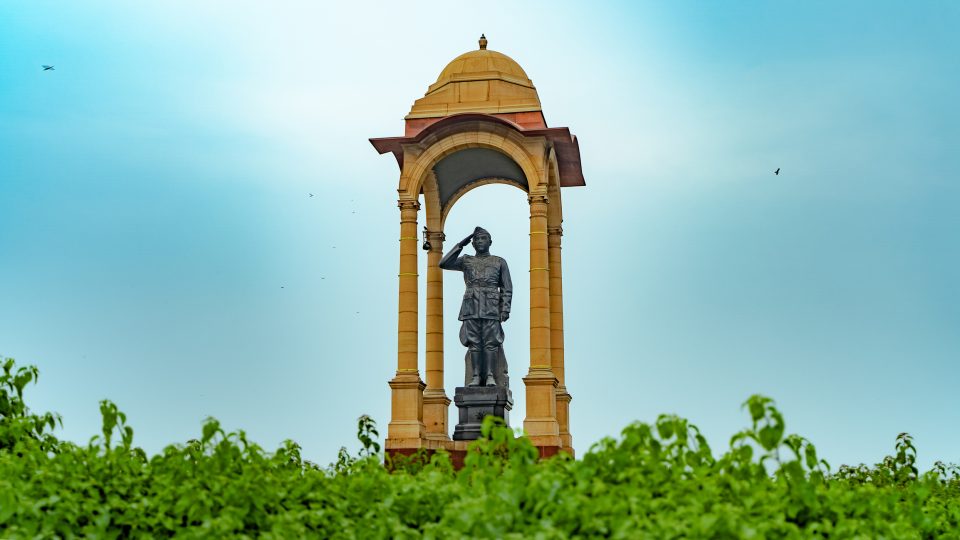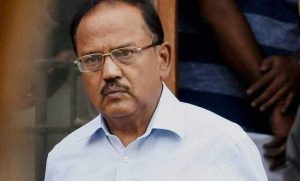
Doval's counterfactual history of Netaji is interesting, but only in fiction

I do not know what connection or interest the Associated Chambers of Commerce & Industry of India (ASSOCHAM) has with Netaji Subhas Chandra Bose. I also have no awareness on why the “country’s oldest apex chamber” should have introduced in its annual calendar from this year, a Netaji Subhas Chandra Memorial Lecture.
However, it would be prudent to be on the lookout for the second edition of this ASSOCHAM event next year, for it has stated that the organisation “hopes to turn this into a yearly event that will celebrate and commemorate the legendary freedom fighter, Shri Subhash (let us not grudge the spelling error as many lesser mortals insert ‘h’ at the end of his name) Chandra Bose, also commonly referred to as #Netaji.” So it could well be a one-off event, organised with a specific purpose.
Also read: How Taipei became Netaji Subhas Chandra Bose’s final port of call
Why another memorial lecture?
It is also difficult to say if there was need for another memorial address, because the Netaji Subhas Open University established by the West Bengal government and which completes a quarter of a century of existence this year, has already been holding a memorial lecture for the past 10 years. The latest lecture was delivered by Professor Rajat Kanta Roy, former Vice-Chancellor, Visva Bharati University and Emeritus Professor of History, Presidency University in January this year.

I also do not know what prompted the organisers to invite National Security Advisor, Ajit Doval to deliver this lecture recently in the Indian capital. Does he have any connect with modern Indian history? Or was it because, he, as Ajay Singh, president of ASSOCHAM and chairman and managing director, SpiceJet, said, “has re-architected (sic) the Indian story around the world under the leadership of our honourable Prime Minister”?
Also read: India wouldn’t have been partitioned if Netaji Subhas Chandra Bose was alive: NSA Doval
But, let us overlook this assertion being an instance of extreme flattery in an era of sycophancy and instead go to what Doval said in regard to Bose and his contribution to the national movement.
However, before taking this up, let us keep in mind the entire narrative surrounding Bose that has been woven in the past nine years, ever since Narendra Modi became Prime Minister.
Bose’s ties with Congress
As we all know, Bose, born in 1897, went to England in 1919 to compete for the Indian Civil Services – succeeded in 1920 but, because he was angered by the Jallianwalla Bagh massacre, left the ICS apprenticeship midway and returned in 1921 to join the national movement.
After joining the Indian National Congress, he began working under Deshbandhu Chittaranjan Das, whom he acknowledged as his political guru. Soon, Bose went along with Swarajists and in 1923-1924 became chief executive officer of Calcutta Municipality after the elections that saw CR Das becoming mayor.
Later in the 1920s, after the political demise of the Swaraj Party, Bose along with Jawaharlal Nehru formed a pressure group within Congress to press for acceptance of ‘Purna Swaraj’ (complete independence) as its goal. He and Nehru remained comrades-in-arms, so to say figuratively.
It is true that Bose had major disagreements with Mahatma Gandhi and despite the former being the Congress president for the 1938 session, Gandhi opposed his candidature in 1939 for the Tripuri session. Even though he defeated Pattabhi Sitaramayya, Bose had no choice but to resign from the Congress in his second term as president because Gandhi made the declaration that does little service to his memory: Sitaramayya’s “defeat was my defeat”.
Also read: Odisha’s moment of pride: Adwaita Gadanayak’s Netaji Statue assignment
Significantly, Bose’s candidature was backed by Rabindranath Tagore, according to whom the Congress leadership featured just two ‘modernists’ – Bose and Jawaharlal Nehru. Significantly, when a signature campaign was mounted at Gandhi’s behest to get Bose to withdraw his candidature, Nehru refused to come on board.
Eventually, Bose resigned but this left a bitter taste in his mouth and he formed the Forward Bloc. Eventually, in January 1941 Bose escaped from his Calcutta residence while under house arrest. The rest of his life story has been romanticised and more of it is legend and myths than factual.
Using Netaji to diss Nehru
Several of Bose’s decisions, including to ally with the Axis powers during World War II remain intensely problematic for the implications if the war had ended the way it did. The detailed investigations ordered by this government could not unearth anything that could change the official historiography on Bose’s last days.
The aforesaid historical details have been mentioned alongside the fact that Nehru was no bitter rival of Bose because this is what constitutes factual history. Barring the last four years of his life, Bose spent two decades in active politics as a Congress (and Swarajist) loyalist.
Instead of emphasising on the most substantive phase of Bose’s political career, the Hindu right-wing in this country has focussed on the most contentious phase of his life. A romantic and courageously halo, which is rightfully Netaji’s, has been juxtaposed by the claim that his legacy was purposely obscured by Nehru because he feared his memory would face a challenge.
Netaji has been used to fit into the political narrative of the Sangh Parivar. Although he is not a political person and has no such role in government, Doval too played the narrative endorsed by the duopoly based in 7, Lok Kalyan Marg and the area called Mahal in Nagpur. The NSA also claimed Bose was a “highly religious man” who carried the Gita with him always.
Also read: How Japan-born Lt Bharti ‘Asha’ joined Subhas Chandra Bose’s all-women military unit
By saying that “history had been unkind” to Bose, Doval was invoking the argument of others in the Hindu right-wing that a cabal of leftist-liberal historians had denied Bose his rightful place in Indian nationalist history and this had been now restored by Prime Minister Narendra Modi. It is “laudable that Prime Minister Narendra Modi is making efforts to revive his legacy,” he said.
The most emphatic statement towards this end has been the government’s decision to install Bose’s statue beneath the vacant canopy at the end of the now renamed Kartavya Path.
Doval’s counterfactual history
Doval, in his Subhas Chandra Bose Memorial Lecture, served his own take of counterfactual history by claiming that if Bose had been present at the time of Independence, India would not have been partitioned.
In his speech he recollected how Muhammad Ali Jinnah, the founder of Pakistan, had expressed that he could only accept one leader, and that leader was Bose.
The crux of the counterfactual contention of Doval is that Bose would have prevented partition if he had lived and been at the helm of political affairs in 1947 in place of Nehru. This argument perpetuates the historically untruthful and pernicious contention that Nehru was in hurry to capture power and that is why he did not wait for the communal embers to get extinguished and prevent the vivisection of the country.
Besides Bose, the Sangh Parivar has also propped up the memory of Sardar Vallabhai Patel and created a counterfactual narrative of what would have happened if he had been the prime minister in place of Nehru.
Niall Ferguson, the Scottish historian in his introduction to the book he anchored, Virtual History, starts by writing a string of “what ifs…”: “What if there had been no English Civil War? What if there had been no American Civil War? What if Britain had stayed out of the First World War?”
“The obvious objection,” he writes, “to such hypothetical or ‘counterfactual’ question is simple: why bother to ask them? Why concern ourselves with what didn’t happen? Just as there is no use crying over spilt milk, runs the argument, so there is no reason to wonder how the spillage might have been averted.”
Also read: RSS and Netaji had same goal of making India great: Mohan Bhagwat
Generations of historians have been disdainful of counterfactual history and historians (or distorians to use Jairam Ramesh’s phrase) who lapse into this gameplay. EH Carr, famous for his treatise What Is History, dismissed this as a mere ‘parlous game’, a ‘red herring’.
Counterfactual history is fun and games in fiction – cinema for instance – but it becomes a worrisome matter when it is introduced in the political discourse. This is done, as by India’s Hindu right-wing because they wish to raise the heckles of their political constituency by contending that what could have been, was not allowed because of a conspiracy by a combine of ‘leftist-liberals’ backed by the Congress, supporters of ‘dynasts’, ‘urban-naxals’, ‘anti-national’ forces all of who have patrons outside India, including in nations inimical to India.
While it is fathomable that leaders of the BJP have presented counterfactual narratives as the Gospel truth from their first day in the RSS shakha, Doval using the same tactics after spending decades in the Indian Police Service is certainly unacceptable. But probably, he is also preparing for another role.
Also read: Parakram Diwas: Modi pays tribute to Netaji; to name 21 islands after soldiers
In that case, are a couple of questions not apt?
- What if Doval had not joined the police force and instead been a fiction writer?
- What if the ASSOCHAM event was organised solely to provide the speaker with a platform to make that claim and ingratiate himself with a political group?
(The writer is a NCR-based author and journalist. His latest book is The Demolition and the Verdict: Ayodhya and the Project to Reconfigure India. His other books include The RSS: Icons of the Indian Right and Narendra Modi: The Man, The Times. He tweets at @NilanjanUdwin)

